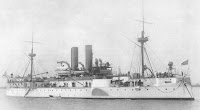 This past week, we've examined the Just War Theory and discussed how America's entry into the wars in Iraq and Afghanistan. Opinions differed as to whether or not the U.S. has conducted itself in a just manner during the war - questions about torture, excessive force and the death of civilians made the issue a tough one to make a decision.
This past week, we've examined the Just War Theory and discussed how America's entry into the wars in Iraq and Afghanistan. Opinions differed as to whether or not the U.S. has conducted itself in a just manner during the war - questions about torture, excessive force and the death of civilians made the issue a tough one to make a decision.The principles of a just war include jus ad bellum, the right to go to war, and jus in bello, right conduct in war. You will see these principles fleshed out in some of the following bullets below:
- A just war can only be waged as a last resort. All non-violent options must be exhausted before the use of force can be justified.
- A war is just only if it is waged by a legitimate authority. Even just causes cannot be served by actions taken by individuals or groups who do not constitute an authority sanctioned by whatever the society and outsiders to the society deem legitimate.
- A just war can only be fought to redress a wrong suffered. For example, self-defense against an armed attack is always considered to be a just cause (although the justice of the cause is not sufficient). Further, a just war can only be fought with "right" intentions: the only permissible objective of a just war is to redress the injury.
- A war can only be just if it is fought with a reasonable chance of success. Deaths and injury incurred in a hopeless cause are not morally justifiable.
- The ultimate goal of a just war is to re-establish peace. More specifically, the peace established after the war must be preferable to the peace that would have prevailed if the war had not been fought.
- The violence used in the war must be proportional to the injury suffered. States are prohibited from using force not necessary to attain the limited objective of addressing the injury suffered.
The weapons used in war must discriminate between combatants and non-combatants.
- Civilians are never permissible targets of war, and every effort must be taken to avoid killing civilians. The deaths of civilians are justified only if they are unavoidable victims of a deliberate attack on a military target. (http://www.mtholyoke.edu/acad/intrel/pol116/justwar.htm)
 Given what we've read and seen about the Spanish American War, how does this war fit with the criteria that we'd discussed? Consider the following:
Given what we've read and seen about the Spanish American War, how does this war fit with the criteria that we'd discussed? Consider the following:1. How did the war begin? - U.S.S. Maine exploded in Havana Harbor but the cause of the blast was unknown, though at the time, an official inquiry determined it to be a mine.1 American newspapers drummed up support for war (fueled by yellow journalism - sensational, if sometimes false, stories and attention grabbing headlines). President McKinley issued an ultimatum to Spain on March 29th to leave Cuba (which it didn't agree to do until April 1st). But when the war was declared, had the U.S. exhausted all options before going to war?
- When Congress voted to declare war on April 19 (311 to 6 in the House and 42 to 35 in the Senate), it adopted the Teller Amendment in which it stated that it had no intention: "to exercise jurisdiction or control over Cuba except in a pacification role and promised to leave the island as soon as the war was over." 1
2. Was peace the ultimate goal? However, during that summer of 1898, business and political interests work on keeping the Philippines once the war is won w/ Spain. American interests brought Emilio Agunaldo, exiled Filipino leader, back to the islands and he heads a new Filipino government which declared its own independence in June and approved a Constitution in November. The American Anti-Imperialist League was created to fight the annexation of the Philippines. 
A three year war with the Filipinos lasted until 1902 with 4,200 American dead and 200,000 Filipino civilians and around 20,000 soldiers dead. 1
Puerto Rico still remains in the U.S.'s hands. Cuba gained its official independence in 1902 after President Teddy Roosevelt decided to allow them to declare it earlier than expected. But the U.S. exercised control over Cuba to supervise its foreign and economic affairs b/c of the Platt Amendment. It did so in 1906 and then again later until President Franklin Roosevelt initiated the Good Neighbor Policy w/ Latin American countries in 1933. 2
Pick one of the two questions above and answer it using info from the websites, the video on TR, and your readings.
1. Library of Congress - http://www.loc.gov/rr/hispanic/1898/chronology.html
2. Cuba by Wikipedia - http://en.wikipedia.org/wiki/Cuba#Modern_history